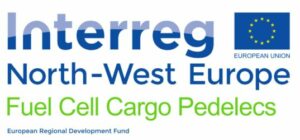Fuel Cell Cargo Bike

- Customer : Interreg NWE
- Website :
- Category : Supply Chain Management, Transport
- Starting Date : 2018
- End Date : 2018
- Tags :
Fuel Cell Cargo Bike
Today, 75% of Europeans live in cities and suffer from air and noise pollution and traffic jams. The transport sector in European cities currently causes up to 50% of emissions and 30% of vehicle kilometres*, thus is one of the major contributors to this issue. Due to expanding e-commerce, the last mile delivery has fundamentally changed. Goods are increasingly ordered online and delivered to the customer’s private address. More frequent but smaller parcels to decentral destinations are increasingly replacing the typical A2B transport from factories to shopping centres. Cargo pedelecs provide a veritable answer to the evolved requirements of last mile delivery. However, modern batteries cannot supply sufficient energy and fail in low temperatures which limit the potential of this promising concept. In contrast, the emission-free fuel cell technology of DLR provides significantly more energy until at least -20°C, is refilled within seconds and is twice as durable than batteries at comparable costs. With these characteristics, one fuel cell cargo pedelec (FCCP) can save 5,5 t CO2 p.a. by replacing combustion engine vehicles.** For efficient exploitation of this potential, this project builds on an innovative logistic concept, tailored for the performance characteristic of FCCPs and the requirements of today’s urban freight transport (WP T1), latest fuel cell technology (WP T2), as well as intense involvement of cities to foster and implementing FCCPs (WP T3). In line with this, one crucial output of this project is a transnational strategic concept concerned with the best integration of emission free FCCPs in logistic delivery chains, including innovative technology and sustainable urban development. This project will facilitate the multiplication of emission free FCCPs, as it provides relevant and replicable information to cities and the transport sector (WP C) to stay abreast of the fundamental changes in the transport sector, reducing CO2 emissions in European cities.
